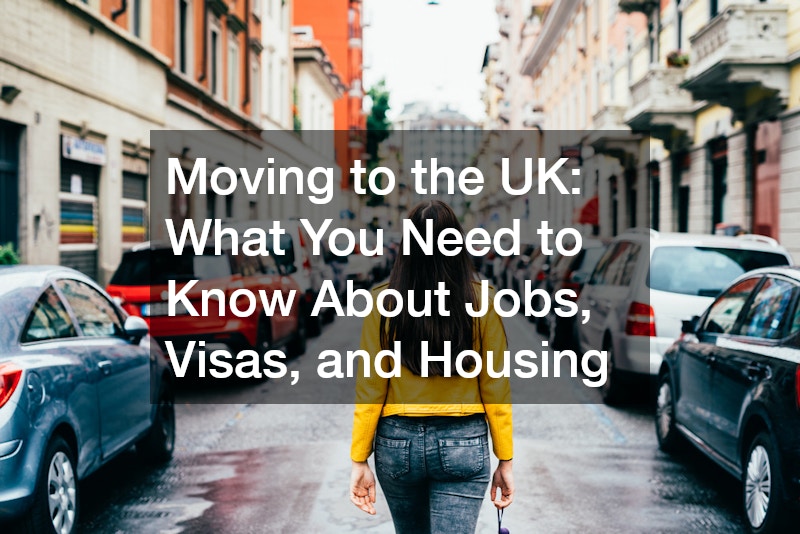Making the decision to move to the United Kingdom is an exciting yet challenging adventure. From securing the right visa to finding a job and suitable housing, the process can feel overwhelming. But with the right preparation and understanding of what’s required, you can make the transition smoothly. In this guide, we’ll explore everything you need to know about visas, jobs, and housing, helping you take the stress out of your big move.
1. Securing the Right Visa
The first step in moving to the UK is determining whether you need a visa. This will depend on your country of origin, any ties you may have with the UK (such as family or previous residency), how long you plan to stay, and whether you want to work while you’re there.
If you do need a visa, you’ll need to decide which type is most appropriate for your situation. For those planning to work, the UK offers several visa options, including the Skilled Worker Visa, which allows people to work in the UK if they have a job offer from an approved employer. This process can be time-consuming, especially since many visas require various documents and certificates to prove eligibility. It’s advisable to give yourself at least three months to gather all the necessary paperwork and submit your visa application.
While many people choose to go through the visa application process independently, others seek assistance from immigration solicitors. These legal professionals can help you navigate complex immigration laws, ensuring you choose the right visa and submit all required documentation accurately.
Once your visa application is submitted, there will be a waiting period while your application is processed. During this time, you can continue preparing for your move, including searching for jobs and housing.
2. Finding a Job in the UK
If you don’t already have a job offer lined up, now is the time to begin your job search. Many companies in the UK require proof that you have the right to work there, so having your visa application underway can be a significant advantage in your job hunt. In fact, once you’ve applied for your visa, you’re likely to see a marked increase in the number of responses to your job applications.
When applying for jobs, remember to update your CV to reflect your new status, clearly stating your citizenship or visa situation. This helps employers understand your eligibility to work in the UK, making it easier for them to consider you for roles.
For those open to relocating anywhere within the UK, job opportunities will be more abundant. Once you secure a job, the location of your employment will determine where you’ll want to focus your housing search. If you’re unfamiliar with the UK job market or need additional support, there are numerous resources and job search platforms to help you along the way.
3. Securing Housing
Once you know where you’ll be working, it’s time to decide where to live. Many people moving to the UK opt to stay in temporary accommodation, such as an Airbnb or short-term rental, for the first few months. This approach allows you to get a feel for different neighborhoods and cities before committing to a long-term rental or purchase.
Alternatively, if you’re ready to settle down immediately, you can begin looking for permanent housing. It’s crucial to do your research beforehand to understand the cost of living in your chosen area, as prices can vary significantly between different cities and towns in the UK.
If you’re not sure where to start, you can consult online property portals, real estate agents, or even housing guides specifically geared toward expats. There are also numerous forums and communities online where newcomers to the UK can share their experiences and offer recommendations for finding housing.
4. Shipping Your Belongings
Another important aspect of relocating to the UK is figuring out how to move your belongings. Since you’ll only be able to bring a limited amount of luggage on your flight, you might need to look into shipping larger items via container. Shipping can be costly, so it’s best reserved for those who plan to stay in the UK for an extended period.
If you’re unsure how long you’ll stay or if you’re just planning to test the waters, you might prefer to leave your belongings in storage in your home country. However, if you’re committing to a longer stay, bringing over your essential items will make your transition smoother and help you feel more settled once you arrive.
5. Preparing for Arrival
Once your visa is approved and you’ve arranged for housing and your belongings, it’s time to book your flight and prepare for arrival. Keep in mind that with some visas, you’ll need to enter the UK within a certain time frame, so it’s important to book your travel as soon as you receive final confirmation.
When you arrive, there are a few important administrative tasks to take care of, such as collecting your Biometric Residence Permit (if required by your visa) and registering for a National Insurance number. This number is necessary for anyone who plans to work in the UK, as it’s used to track taxes and social security contributions.
You’ll also want to register with the National Health Service (NHS) if your visa grants you access to healthcare. Be sure to register with a local GP practice as soon as possible, as this is required to receive healthcare services in the UK.
6. Final Tips for a Smooth Transition
Moving to the UK is a significant life change, but with careful planning and preparation, it can be an incredibly rewarding experience. Before you leave, consider hosting a going-away party to say goodbye to loved ones and celebrate your exciting new chapter. Once you arrive in the UK, immerse yourself in your new surroundings, and enjoy everything this vibrant country has to offer.
By following the steps outlined here, you can ensure a smoother transition to life in the UK, leaving you free to focus on your new job, housing, and future adventures.
.





